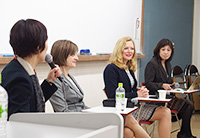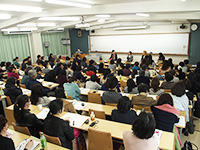IGS Symposium: “How Far Have We Come in Equal Political Representation? Lessons from the 2016 Presidential Election in the US”
Institute for Gender Studies of the Ochanomizu University hosted an international symposium, titled “How Far Have We Come in Equal Political Representation? Lessons from the 2016 Presidential Election in the US,” on March 18th, 2017. The Japan-America Women Political Scientists Symposium (JAWS)—an academic network first established in 2000 among female political scientists in Japan and the US—served as a co-organizer of the symposium.
In the first session, two guest speakers—Melissa Deckman (Washington College) and Julie Dolan (Macalester College)—delivered keynote speeches. Dr. Deckman first opened the session by examining the “gender gap” (i.e., a popularly used term to explain the behavior of American voters where women have consistently voted for Democratic presidential candidates at higher rates than men for the past four decades) in the 2016 presidential election. Specifically analyzing voting patterns of female voters in the recent election, Dr. Deckman confirmed that Republican women, rather than defecting their party in order to vote for Hilary Clinton, maintained their support for the Republican nominee Donald Trump. Digging deeper, she illustrated that Republican women behaved the way they did because they held attitudes that were far more in line with Trump’s policy positions (e.g., abortion, economic, immigration policies) than they were with Clinton’s. Next, Dr. Dolan analyzed gender dynamics of the election by applying the concept of the “double bind,” where female candidates are required to meet gendered expectations by demonstrating sufficient masculinity as well as femininity. She argued that the 2016 election results suggest that female candidates still struggle to be considered on equal footing with male candidates when contesting the highest office in the country.
The second session took place in a roundtable format, looking more closely into the process and outcomes of the 2016 presidential election. Melissa Deckman (Washington College), Julie Dolan (Macalester College), Hiroko Takeda (Nagoya University), and Ki-young Shin (Ochanomizu University) served as panelists. Dr. Takeda began the session by raising key questions related to the presentations delivered by the two speakers: would the result look different if Sanders became the presidential nominee of the Democratic party; what was the impact of the absentee vote in determining the outcome; how did president Obama’s image in the media (i.e., shedding tears during gun speech) impact people’s understandings regarding masculinity and femininity of political leadership; what role does the media play in creating images of candidates during US election campaigns? Similarly, Dr. Shin requested speakers to elaborate on distinct characteristics of American politics to the Japanese audience, such as the meaning of partisanship in shaping the behavior of the American electorate, and different support groups and allies of the Democratic and Republican parties. She also raised questions specifically related to female candidates on the campaign trail: does the idea of the double-bind apply similarly to female candidates in the conservative/Republican party (as it did to Hilary Clinton in the Democratic party); to what extent does the pressure to juggle femininity and masculinity lead female candidates to appear anti-feminist? The speakers covered a number of important themes related to American politics while addressing these questions, such as voter apathy and parties’ mobilization strategies, polarization of the US media, as well as a growing partisan divide in policy views among voters. The speakers also noted a high level of uncertainty present in today’s American politics, which makes it difficult to make projections regarding the future of the Trump administration.
The symposium attracted a large number of audience, who raised interesting questions regarding the voting behavior of the American electorate, as well as social changes taking place in the US that have important implications for future presidential elections. Overall, the event offered a valuable opportunity for the public and academic professionals in Japan to learn about the recent presidential election from US experts on gender and politics. Additionally, the participants were able to deepen their understandings regarding the past, present, and future of American politics.
Jiso Yoon
(JSPS Postdoctoral Research Fellow, Ochanomizu University)
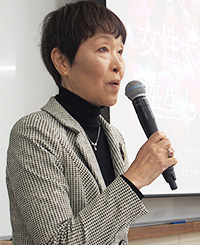 Yayoi Izaki
Yayoi Izaki
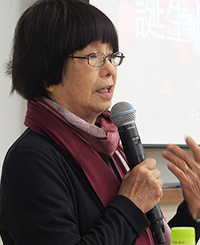 Tokuko Ogai
Tokuko Ogai
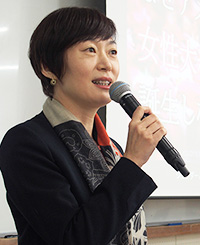 Ki-young Shin
Ki-young Shin
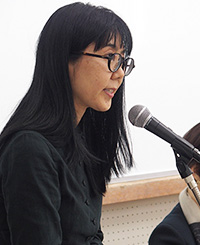 Hiromi Tanaka
Hiromi Tanaka
 Melissa Deckman
Melissa Deckman
 Julie Dolan
Julie Dolan
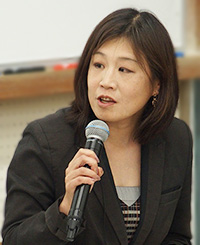 Hiroko Takeda
Hiroko Takeda
